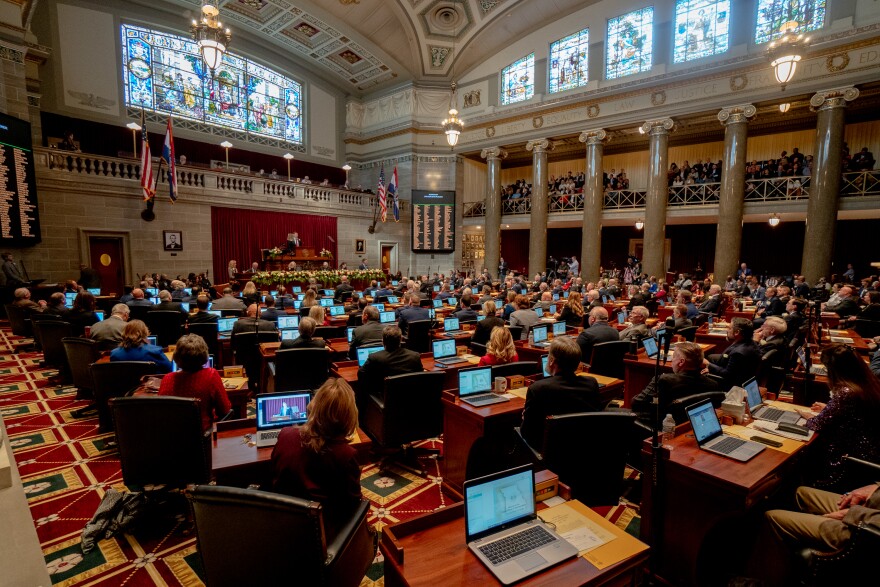The Missouri House gave its initial approval late Tuesday to a $45.6 billion state budget clouded by hours of repeated disagreements between parties over how much money the state can spend, as well as language against diversity, equity and inclusion policies.
Members went through 13 bills on next year’s budget as well as a $2 billion supplemental budget bill for the remainder of this fiscal year, which ends June 30.
Included in the budget is roughly $9.7 billion in K-12 spending, including full funding for school transportation costs. Additionally, the House included a child care subsidy payment increase of $78 million and money to continue to fund Medicaid expansion.
The budget is roughly $2 billion less than the one proposed by Gov. Mike Parson, containing multiple cuts and funding shifts.
Some of the changes include the elimination of funding for a pre-kindergarten program and funding for public libraries.
However, Rep. Cody Smith, R-Carthage, said that money within the foundation formula could be available for expanded pre-K, if the legislature decides to pass it separately from the budget.
The debate over public library funding carried over from the House Budget Committee to the floor. Last week, Smith proposed a cut of $4.5 million in state aid to public libraries.
Smith cited a lawsuit filed against the state by the American Civil Liberties Union of Missouri on behalf of the Missouri Association of School Librarians and the Missouri Library Association as the reason for the cut.
The lawsuit seeks to overturn a state law passed last session that bans sexually explicit material in schools and has resulted in school districts pulling books from their shelves.
“I don't think we should subsidize that effort, so we're going to take out the funding,” Smith said.
Rep. Peter Merideth, D-St. Louis, sought to restore that funding on Tuesday.
“I don't think it's appropriate for us to defund state aid to public libraries because we're mad that libraries are suing to question what turned into a book ban passed by this state,” Merideth said.
One of Parson’s major proposals that is not currently in the operating budget is $859 million to widen sections of Interstate 70 in the St. Louis, Columbia and Kansas City areas. Smith said he wants to wait until another budget bill on larger building projects is discussed.
Over the more than eight hours of debate on Tuesday, Democrats repeatedly attempted to add amendments either restoring or adding funding to programs throughout state government.
While some of their amendments were approved, many were not, with Smith and other Republicans continually citing what they perceived to be insufficient funding despite a large state surplus that includes federal ARPA money.
In the closest vote of the budget discussion, an attempt by Rep. Deb Lavender, D-Manchester, failed to give an 8.7% increase in base pay for home care workers who help people with disabilities.
Lavender proposed $308 million for the raises.
“Heaven forbid we increase our budget to accommodate helping people in Missouri. So we're worried more about what we're leaving in the bank and not spending than helping and caring for Missourians?” Lavender said. “I don't get that at all.”
Lawmakers voted 73-71 against the amendment, with 28 Republicans joining Democrats in voting for it.
In addition to protesting what they perceived as overly tight purse strings, Democrats spoke throughout the debate against added language that stated that “no funds shall be expended for staffing, vendors, consultants, or programs associated with diversity, equity and inclusion.”
The language was included on every bill by Rep. Doug Richey, R- Excelsior Springs.
“When you look at the language in front of us, we're just simply saying you can't promote treating one group of people better than others,” Richey said.
Rep. LaKeySha Bosley, D-St. Louis, called the language dangerous, especially in relation to public safety.
“We can go to the historical facts of what police have done to marginalized communities in this country and yet we're going to stand by and allow this amendment to get onto this bill for public safety funding,” Bosley said.






